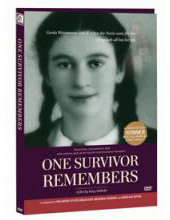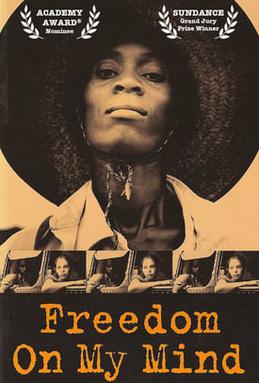
The Civil Rights Memorial is an American memorial in Montgomery, Alabama, created by Maya Lin. The names of 41 people are inscribed on the granite fountain as martyrs who were killed in the civil rights movement. The memorial is sponsored by the Southern Poverty Law Center.

The Southern Poverty Law Center (SPLC) is an American 501(c)(3) nonprofit legal advocacy organization specializing in civil rights and public interest litigation. Based in Montgomery, Alabama, it is known for its legal cases against white supremacist groups, for its classification of hate groups and other extremist organizations, and for promoting tolerance education programs. The SPLC was founded by Morris Dees, Joseph J. Levin Jr., and Julian Bond in 1971 as a civil rights law firm in Montgomery.

King: A Filmed Record... Montgomery to Memphis is a 1970 American documentary film biography of Martin Luther King Jr. and his creation and leadership of the nonviolent campaign for civil rights and social and economic justice in the Civil Rights Movement.

Morris Seligman Dees Jr. is an American attorney known as the co-founder and former chief trial counsel for the Southern Poverty Law Center (SPLC), based in Montgomery, Alabama. He ran a direct marketing firm before founding SPLC. Along with his law partner, Joseph J. Levin Jr., Dees founded the SPLC in 1971. Dees and his colleagues at the SPLC have been "credited with devising innovative ways to cripple hate groups" such as the Ku Klux Klan, particularly by using "damage litigation".
Eyes on the Prize: America's Civil Rights Movement is an American television series and 14-part documentary about the 20th-century civil rights movement in the United States. The documentary originally aired on the PBS network, and it also aired in the United Kingdom on BBC2. Created and executive produced by Henry Hampton at his film production company Blackside, and narrated by Julian Bond, the series uses archival footage, stills, and interviews by participants and opponents of the movement. The title of the series is derived from the title of the folk song "Keep Your Eyes on the Prize", which is used as the opening theme music in each episode.
Charles Eli Guggenheim was an American documentary film director, producer, and screenwriter. He was the most honored documentary filmmaker in the academy history, winning four Oscars from twelve nominations.

Freida Lee Mock is an American filmmaker, director, screenwriter and producer. She is a co-founder of the American Film Foundation with Terry Sanders. Her documentary, Maya Lin: A Strong Clear Vision (1994) won an Academy Award for Best Feature Documentary in 1995.

One Survivor Remembers is a 1995 documentary short film by Kary Antholis.

The Full Frame Documentary Film Festival is an annual international event dedicated to the theatrical exhibition of non-fiction cinema founded by Nancy Buirski, a Pulitzer Prize-winning photo editor of The New York Times and documentary filmmaker.
Mississippi Cold Case is a 2007 feature documentary produced by David Ridgen of the Canadian Broadcasting Corporation about the Ku Klux Klan murders of two 19-year-old black men, Henry Hezekiah Dee and Charles Eddie Moore, in Southwest Mississippi in May 1964 during the Civil Rights Movement and Freedom Summer. It also explores the 21st-century quest for justice by the brother of Moore. The documentary won numerous awards as a documentary and for its investigative journalism.

Freedom on My Mind is a 1994 feature documentary film that tells the story of the Mississippi voter registration movement of 1961 to 1964, which was characterized by violence against the people involved, including multiple instances of murder.
Nine from Little Rock is a 1964 American short documentary film directed by Charles Guggenheim about the Little Rock Nine, the first nine African-American students to attend an all-white Arkansas high school in 1957.

Mighty Times: The Children's March is a 2004 American short documentary film about the Birmingham, Alabama civil rights marches in the 1960s, highlighting the bravery of young activists involved in the 1963 Children's Crusade. It was directed by Robert Houston and produced by Robert Hudson. In 2005, the film won an Oscar at the 77th Academy Awards for Documentary Short Subject. The film was co-produced by the Southern Poverty Law Center and HBO.

A City Decides is a 1956 American short documentary film directed by Charles Guggenheim about the racial integration of St. Louis Public Schools. It was nominated for an Academy Award for Best Documentary Short.
Mighty Times: The Legacy of Rosa Parks is a 2002 American short documentary film directed by Robert Houston and produced by Robert Hudson about the 1955/56 Montgomery bus boycott led by Rosa Parks.

The Barber of Birmingham: Foot Soldier of the Civil Rights Movement is a 2011 documentary film about James Armstrong, one of the unsung heroes of the Civil Rights Movement.
The Witness: From the Balcony of Room 306 is a 2008 documentary short film created to honor the 40th annual remembrance of the life and death of Martin Luther King Jr. Directed by Adam Pertofsky, the film received a 2008 Oscar nomination in the "Best Documentary Short Subject" Category at the 81st Academy Awards.
The history of the 1954 to 1968 American civil rights movement has been depicted and documented in film, song, theater, television, and the visual arts. These presentations add to and maintain cultural awareness and understanding of the goals, tactics, and accomplishments of the people who organized and participated in this nonviolent movement.
Connie Field is an American film director known for her work in documentaries.
Dee Hibbert-Jones is a film director, producer and animator.











